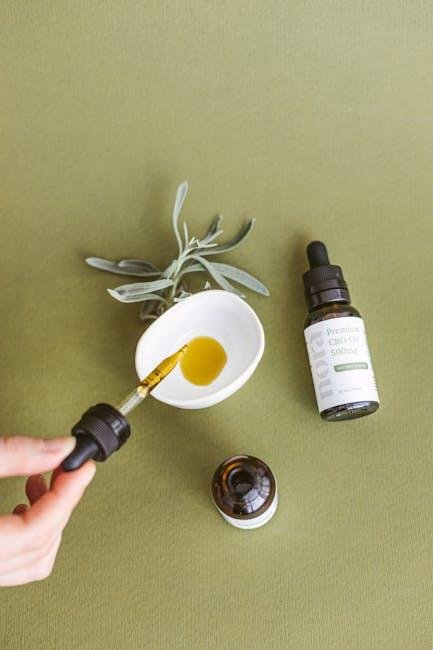In the relentless rhythm of modern life, stress has become an unwelcome companion for many. While reaching for a quick fix might seem tempting, nature offers a gentler, time-honored alternative. Herbal remedies, with their rich history and soothing properties, invite us to slow down and find balance amid the chaos. This article explores some of the best herbal allies for stress relief—plants that have been cherished across cultures and centuries—offering a natural path to calm the mind and rejuvenate the spirit.
Table of Contents
- Understanding Stress and Its Impact on Daily Life
- Exploring the Science Behind Herbal Stress Relief
- Calming Herbs to Soothe the Mind and Body
- Herbal Teas and Tinctures for Immediate Relaxation
- Incorporating Adaptogens into Your Stress Management Routine
- Precautions and Best Practices When Using Herbal Remedies
- Q&A
- In Summary

Understanding Stress and Its Impact on Daily Life
Stress is an unavoidable part of modern life, often triggered by work pressures, personal challenges, or unexpected events. When left unchecked, it can manifest physically, causing headaches, fatigue, and sleep disturbances, or mentally, leading to anxiety and irritability. The key lies in recognizing the subtle signs early and understanding that stress is more than just a mental state — it influences overall well-being and productivity. By adopting natural approaches, you can gently support your body’s ability to maintain balance and resilience.
Herbal remedies have been revered for centuries across different cultures for their calming and restorative properties. Incorporating these herbs into your daily routine can provide a natural shield against the mounting pressures of everyday life. Some of the most effective herbs include:
- Ashwagandha: Known as an adaptogen, it helps modulate the body’s stress response.
- Chamomile: Widely used for its soothing effects and ability to promote restful sleep.
- Lavender: Offers aromatherapeutic benefits that reduce anxiety and encourage relaxation.
- Passionflower: Supports mental calmness and can ease irritability.
| Herb | Primary Benefit | Best Use |
|---|---|---|
| Ashwagandha | Reduces cortisol levels | Capsule or tea |
| Chamomile | Sleep aid and anxiety relief | Tea infusion |
| Lavender | Relaxation and mood improvement | Essential oil or tea |
| Passionflower | Calming nervous system | Tea or tincture |
Exploring the Science Behind Herbal Stress Relief
Understanding how herbs alleviate stress begins with their interaction with the body’s neurochemical pathways. Many herbal remedies contain compounds that influence neurotransmitters such as serotonin, GABA (gamma-aminobutyric acid), and dopamine, which play pivotal roles in regulating mood and anxiety levels. For instance, adaptogenic herbs like Ashwagandha and Rhodiola gently modulate the adrenal system, helping the body maintain balance during periods of prolonged stress. This neurochemical balance not only reduces the sensation of anxiety but also enhances mental clarity and promotes restful sleep.
Beyond neurochemistry, herbal remedies often provide a multi-faceted approach to stress reduction by combining calming effects with nutritional support. Many contain antioxidants and anti-inflammatory agents that protect the brain from oxidative stress, which is frequently elevated under chronic stress conditions. Below is a quick guide summarizing key active compounds found in popular stress-relieving herbs and their effects:
| Herb | Key Compound | Effect on Stress |
|---|---|---|
| Chamomile | Apigenin | Promotes relaxation and mild sedation |
| Lavender | Linalool | Reduces anxiety and calms the nervous system |
| Valerian | Valerenic acids | Supports restful sleep and reduces nervous tension |
Calming Herbs to Soothe the Mind and Body
When life becomes overwhelming, turning to nature’s own calming botanicals can provide a gentle respite. Among the most cherished are lavender, known for its soothing fragrance that eases anxiety and promotes restful sleep; chamomile, cherished for its ability to calm a racing mind and reduce muscle tension; and lemon balm, which can uplift mood while gently relaxing the nervous system. These herbs work harmoniously with the body’s natural rhythms, offering a soft embrace of tranquility without harsh side effects.
In addition to their calming effects, many of these herbs contribute valuable nutrients and antioxidants, making them a holistic approach to stress relief. Below is a quick guide to some popular calming herbs and their primary benefits:
| Herb | Key Benefits | Best Usage |
|---|---|---|
| Lavender | Reduces anxiety, improves sleep quality | Essential oils, teas, bath infusions |
| Chamomile | Calms nerves, eases muscle tension | Tea, tinctures, extracts |
| Lemon Balm | Boosts mood, relieves stress | Fresh leaves in tea, capsules |
| Passionflower | Relaxes nervous system, aids insomnia | Tinctures, teas |
| Valerian Root | Promotes deep sleep, reduces anxiety | Capsules, teas, extracts |
Herbal Teas and Tinctures for Immediate Relaxation
When tension grips your mind, reaching for a cup of herbal tea can provide swift solace. Chamomile and lavender are classic choices, known for their gentle sedative properties that calm the nervous system without drowsiness. Peppermint tea, with its refreshing aroma, not only relaxes muscles but also helps clear mental fog, offering immediate clarity and comfort. For those seeking a deeper sense of calm, a blend infused with lemon balm and passionflower can soothe racing thoughts effectively, making stress feel more manageable in minutes.
In addition to teas, herbal tinctures serve as powerful allies for rapid relief. Concentrated extracts like valerian root and kava kava work quickly to reduce anxiety and induce tranquility, perfect for moments when stress peaks unexpectedly. They are easy to take on the go and can be combined with teas for a personalized relaxation ritual. Here’s a quick reference to some popular herbs and their primary effects:
| Herb | Form | Primary Benefit |
|---|---|---|
| Chamomile | Tea | Calming, reduces anxiety |
| Valerian Root | Tincture | Deep relaxation, sleep aid |
| Lemon Balm | Tea/Tincture | Soothes nerves, uplifts mood |
| Kava Kava | Tincture | Relieves anxiety, promotes calm |
| Peppermint | Tea | Refreshes and relaxes |
Incorporating Adaptogens into Your Stress Management Routine
Adaptogens are nature’s subtle powerhouses, designed to help your body maintain balance amid the chaos of daily life. These remarkable herbs work by modulating your stress response, enhancing your resilience to physical, emotional, and environmental stressors. Integrating adaptogens like ashwagandha, rhodiola rosea, and holy basil into your daily routine can gently support your nervous system and promote a calmer, more centered mindset. Whether brewed as a tea, infused in a tincture, or encapsulated as supplements, these versatile botanicals offer a natural complement to healthy stress management habits.
To effectively incorporate adaptogens, start with a small dose and observe how your body responds. Pair them with mindful practices, such as meditation or gentle exercise, to maximize their benefits. Here’s a simple guide to help you choose the best adaptogen for your stress relief needs:
| Adaptogen | Primary Benefit | Best Taken As |
|---|---|---|
| Ashwagandha | Reduces anxiety & improves sleep | Capsules or tea |
| Rhodiola Rosea | Enhances energy & combats fatigue | Tincture or capsules |
| Holy Basil | Balances mood & supports immune health | Tea or tincture |
- Consistency: Regular use is key to unlocking adaptogens’ full potential.
- Quality: Opt for organic and sustainably sourced products.
- Consultation: Check with a healthcare provider if you’re pregnant, nursing, or on medication.
Precautions and Best Practices When Using Herbal Remedies
While herbal remedies can offer a gentle path toward calming the mind, it’s essential to approach them with mindfulness and care. Always consult a healthcare professional before incorporating any new herb into your routine, especially if you have pre-existing medical conditions or are taking other medications. Herbs can interact with pharmaceuticals or trigger allergic reactions. Start with small doses and observe how your body reacts before moving to a full regimen.
- Purchase herbs from reputable sources to ensure quality and purity.
- Avoid mixing multiple herbs without professional advice to prevent unwanted side effects.
- Keep a consistent schedule to monitor effects clearly.
Remember, natural does not always mean risk-free. Pay attention to your body’s signals and discontinue use if you notice any discomfort such as headaches, nausea, or digestive upset. When storing herbal supplements, protect them from moisture and heat to preserve their potency. Below is a simple guide to help you navigate common considerations:
| Precaution | Reason | Example |
|---|---|---|
| Avoid during pregnancy | Risk of harm to fetus | Valerian root |
| Check drug interactions | May reduce medication effectiveness | St. John’s Wort |
| Observe allergy signs | Could trigger rash or swelling | Chamomile |
Q&A
Q&A:
Q1: Why consider herbal remedies for stress relief instead of conventional treatments?
A1: Herbal remedies offer a natural approach to managing stress, often with fewer side effects than pharmaceuticals. Many people appreciate their holistic benefits, which can support overall well-being alongside mental calmness. Plus, herbs have been used for centuries across cultures, lending centuries of anecdotal evidence to their efficacy.
Q2: What are some of the most popular herbs known to reduce stress?
A2: Some of the top stress-busting herbs include:
- Ashwagandha – Renowned for promoting calm and balancing cortisol levels.
- Chamomile – Famous for its soothing properties and gentle relaxation effects.
- Lavender – Often used aromatically to ease anxiety and improve sleep quality.
- Lemon Balm – Known to uplift mood and diminish nervous tension.
- Rhodiola Rosea – An adaptogen that helps the body respond to stressors more resiliently.
Q3: How do these herbal remedies work to alleviate stress?
A3: Many herbal remedies contain active compounds that interact with the nervous system, either by modulating neurotransmitters such as GABA and serotonin or by balancing stress hormones like cortisol. Adaptogenic herbs help the body adapt to physical and emotional stress more efficiently, promoting a state of equilibrium.
Q4: Are there risks or side effects associated with using herbal remedies for stress?
A4: While generally considered safe, herbs can have side effects or interact with medications. For example, St. John’s Wort, another stress-related herb, can interfere with antidepressants. It’s important to consult a healthcare professional before adding herbal supplements, especially for pregnant women, those with chronic conditions, or people on prescription meds.
Q5: How should one incorporate herbal remedies into their stress management routine?
A5: Start with small doses to see how your body responds. Herbal teas, tinctures, or capsules are common forms. Consistency is key—herbal effects often build gradually. Pairing herbal remedies with mindful practices such as meditation, exercise, and adequate sleep amplifies their stress-relieving potential.
Q6: Can herbal remedies replace professional mental health treatments?
A6: Herbs can be a helpful complement but shouldn’t replace professional medical advice or therapy for serious stress-related disorders. They work best as part of a balanced approach to mental health and wellness.
Q7: Where can one source high-quality herbal remedies?
A7: Choose reputable suppliers who provide transparency about ingredient sourcing and manufacturing practices. Organic certification and third-party testing are good indicators of quality and safety.
Q8: Any final tips for someone beginning their herbal journey for stress relief?
A8: Be patient and mindful. Observe how different herbs affect your mood and energy. Keep a journal of your experiences and consult experts when in doubt. Remember, nature’s remedies can be powerful allies in nurturing calm amidst life’s chaos.
In Summary
As the gentle embrace of nature’s remedies continues to captivate those seeking solace, herbal solutions offer a timeless path to unwinding the knots of daily tension. While the journey to stress relief is deeply personal, these botanical allies remind us that sometimes, the simplest leaves and roots hold the most profound comfort. Embracing these herbs with mindful intention can be more than just a remedy—it can be an invitation to pause, breathe, and rediscover balance in the midst of life’s whirlwind.

